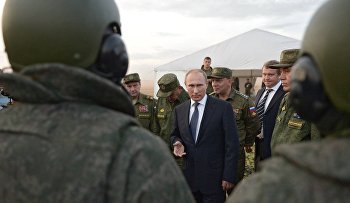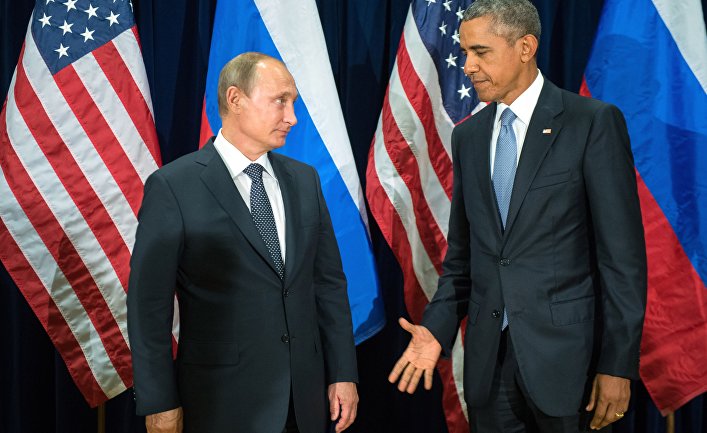The United States takes Russian military involvement in Syria suspiciously serious. For the first time the US removed its aircraft carrier from the tremulous region, which was always a symbol of its naval power.
Russia, like the Soviet Union before, has nothing to boast about in its fight against Muslims. Catastrophic failure in Afghanistan and a cruel war in Chechnya, where they finally entered into a convention with the terrorist Kadyrov, carry little conviction into its history sheet.
So why President Putin, so highly praised by his supporters as "a brilliant strategist," sends Russian troops to help the Syrian military? The experts get their answer ready at once: the Syrian dictator had no chance to stay in power in the long run, irrespective of who would prevail in this country — Syrian opposition or Islamic extremists. In this situation the Russian Federation can lose both its only naval base outside Russia and a rich arms market.
Another political advantage for Russia is the increased flow of refugees heading off to Europe, where the situation is already getting out of control. The chaos and problems in the EU only benefit Moscow. One also can't underestimate the psychological impact of the Syrian operation on the Russian society dreaming of a revival of its former glory and respect from the West.
Yet again the US considers Russia its greatest enemy. Although this disillusionment after the Soviet collapse came a bit late, it is impossible not to notice. Russians came around quicker and they see the West, primarily the United States, as a threat to their ruling elite. Consequently, the strategic rivalry for the world superpower status is back on track, but the rules of the game have slightly changed. Nationalism has replaced ideology.

Despite the fact that Russia is lagging behind the US, Russians are good students and they learn quickly. A sharp rise of the United States was based on the powerful defense industry in the 50s and 60s. Today we can see the same situation in Russia. However, the main point is different: the country's infrastructure is not ready to serve all of Putin's projects. Unlike Russia, the US does not have strikingly different cultural and ethnical states, like Muslim areas of the country. Moreover, the US has no borders with Islamic countries.
In today's world, Islam is starting to play an increasingly important role: the number of Muslims is growing, and they do not hide their intention to conquer the world. The idea of a caliphate may seem unrealistic to some, but nearly 2 billion Muslims is a number not be underestimated.
Whatever the American "restraint" in the Middle East means, either proof of its loss as a superpower or another sign of President Obama's weakness of his foreign policy, it's obvious that Russia has taken a new burden in the region. What if it's all part of the "destabilization" process?
Is it #ISIL they're fighting? #Lavrov questions US-led coalition's true goals http://t.co/E4V0VkOeQF pic.twitter.com/njTJHlx0go
— Sputnik (@SputnikInt) October 13, 2015
What's the best way to weaken your enemy without direct confrontation? A complicated situation in the Caucasus and instability in Afghanistan after NATO troops left the country, is a known fact that Russians aren't trying to hide. Chechnya is in peace so far, but far from the Russian control. The Kremlin and its supporters might not like it, but there's nothing they can do with the strongest Muslim pressure in the south-eastern borders of the country in the future.
Meanwhile the Russian Federation deserves recognition for the fact that it manages its own Muslim population better than Europe. Approximately 30 million of Muslims in Russia enjoy freedom of religious belief, have their own mosques, and even every sixth soldier in the army is Muslim. But the existing Islamic terrorism (sometimes brutally suppressed, sometimes accepted as a partner in the partition of power) shouldn't be underestimated.
Russia's entrance into the fight against ISIL, revealed the US to be a fraud. http://t.co/rt99hascT3 pic.twitter.com/cB5oIPXoGV
— CounterPunch (@NatCounterPunch) October 12, 2015
It is still an open question as to whether such situation remains precarious, and what will happen if it escalates. The destabilization of the country can be very simple: the post-communist system, in terms of history, is very young and vulnerable. Anyone interested in weakening of Russia, can't help but notice its mistakes in giving preference to the defense industry neglecting development of infrastructure. Thanks to its nuclear arsenals Russian armed forces are impenetrable, so only some internal collapse could trigger any change. An internal destabilization looks like the most beneficial form, but it also carries some risks.
If there is really an intention to make Russia an enemy of Islam, thus taking US's current place as the main adversary of the Muslim world, we can really expect tremendous changes in the international arena in the years to come.






